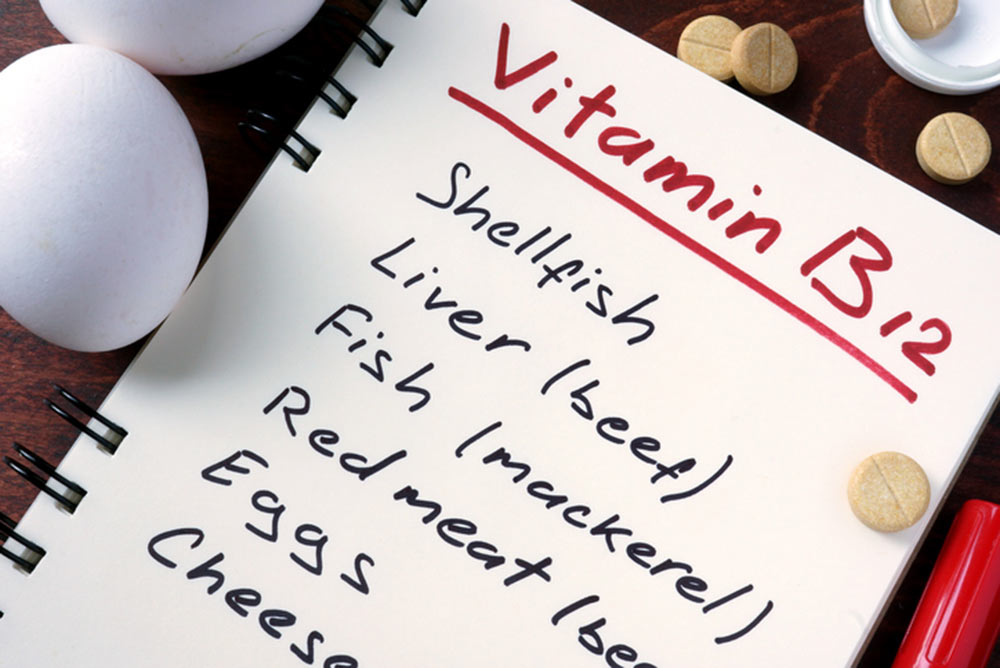
iStock
MOST DAILY nutrition requirements are best met through diet. But when it comes to Vitamin B12, an extra boost can help, especially for those 50 and older. For this age group, the recommendation from the Institute of Medicine (IOM) is to get “most” daily B12 through supplements or fortified foods.
Low vitamin B12 has been linked to both depression and dementia—specifically “poor memory and trouble thinking”—as well as fatigue, muscle weakness, constipation and other intestinal difficulties, and trouble maintaining balance, according to a recent article in Live Science.
Vitamin B12 deficiency was listed as one of two causes of depression, alongside hypothyroidism, in a New York Times diagnosis column last month.
Many of these symptoms are related to anemia, but neurological difficulties can occur before or without anemia. (These symptoms can also be triggered by medical conditions other than B12 deficiency.)
Though low B12 levels have been found across all age groups starting at age 26, adults over age 50 are at particular risk due to thinning of the stomach lining —“atrophic gastritis”—that interferes with B12 absorption.
Other impediments to absorption include antibiotics, especially when taken over a long period of time, and tetracycline in particular—as well as other medications such as colchicine (used to treat gout). Vitamin B12 deficiency caused by absorption problems affects between 1.5% and 15% of the public.
Vitamin B12 aids in the production of red blood cells, facilitating transport of oxygen to the organs, and affects cell metabolism and DNA production—with notable effects on immune function and mood.
B12 supplements can work quickly to improve mood. After little more than a week taking supplements, a friend who had been struggling with low-mood issues for years, wrote via e-mail that he felt “pretty good.” He said, “I am still amazed that none of my doctors or psychologists raised this issue, and [previous] tests never flagged the level in the same way as the University of Pittsburgh Medical Center (UPMC) did.”
Before taking supplements, his level was 321 pg/ml (picograms/milliliter) and over the years had hovered around 300. At UPMC, he was advised to take the oral dose typical for those with low levels: beginning with 2000mcg/day for 4-5 days, and then moving to 1000/day.
(These amounts are 50-100 times the RDA: in fact, in 2016, the FDA lowered the daily value recommended for adults to 2.5 mcg.)
After one month, his level registered 738, and he’s feeling good. Although aware that the placebo effect may be playing a role, he has high hopes.
The “reference range” for B12, which includes 95% of the healthy population, is 200-1100 pg/ml. However, according to the UPMC evaluation report, 5 to 10% of patients with values between 200-400 pg/ml (picograms/milliliter) report neuropsychiatric difficulties. Only 1% of patients with values above 400 report problems.
Most people with difficulty absorbing B12 from food can more easily absorb the synthetic vitamin added to fortified foods and dietary supplements, according to the NIH Vitamin B12 factsheet. While intramuscular injections of vitamin B12 traditionally given to bypass absorption problems are still often the standard treatment for B12 deficiency, research on oral supplements shows they work equally well.
Although B12 has not been proven to have an independent effect on cognition, low B12 levels have been positively associated with cognitive decline. Because B12 is water-soluble, the body generally absorbs as much as it needs and gets rid of the rest. As a result of its “low potential for toxicity,” the IOM has not established an upper level for B12, although blood levels over 900 pg/ml could reflect poor absorption.
Anyone who wants to raise their B12 levels should not forget food. Except for vegans, most people get a healthy amount of B12 from animal sources: fish, red meat, poultry and eggs. For a quick boost, the highest B12 levels are found in clams and beef liver, but even containing much lower levels, fortified breakfast cereals can supply 100% of the daily recommended amount. (See NIH chart.)
—Mary Carpenter
Well-Being Editor Mary Carpenter writes every Tuesday about the ins and outs of staying healthy.
